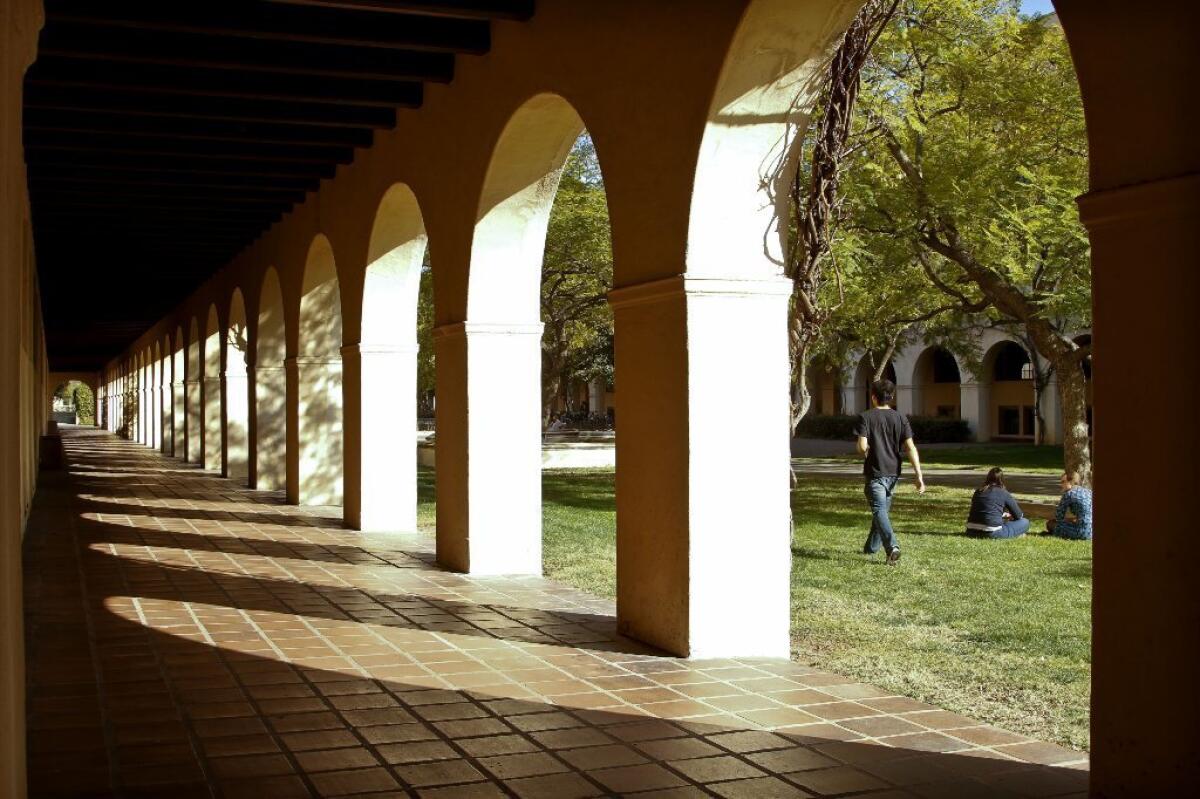How a mind-controlled robotic arm paved the way for Caltech’s new neuroscience institute

- Share via
Sometimes the biggest gifts arrive in the most surprising ways.
A couple in Singapore, Tianqiao Chen and Chrissy Luo, were watching the news and saw a Caltech scientist help a quadriplegic use his thoughts to control a robotic arm so that — for the first time in more than 10 years — he could sip a drink unaided.
Inspired, Chen and Luo flew to Pasadena to meet the scientist, Richard Andersen, in person.
Now they’ve given Caltech $115 million to shake up the way scientists study the brain in a new research complex.
Construction of the Tianqiao and Chrissy Chen Institute for Neuroscience at Caltech will begin as early as 2018 and bring together biology, engineering, chemistry, physics, computer science and the social sciences to tackle brain function in an integrated, comprehensive way, university officials announced Tuesday.
The goal of connecting these traditionally separate departments is to make “transformational advances” that will lead to new scientific tools and medical treatments, the university said. Research in shared labs will include looking more deeply into fundamentals of the brain and exploring the complexities of sensation, perception, cognition and human behavior.
Neuroscience research has advanced greatly in recent years, Caltech President Thomas Rosenbaum said. The field now has the tools to look at individual neurons, for example, as well as the computer power to analyze massive data sets and an entire system of neurons.
Collaborating across traditional academic boundaries takes it to the next level, he said. “The tools are at a time and place where we think that the field is ready for that sort of combination.”
The gift is one of the largest ever received at Caltech.

Erik Sorto controls a robotic arm with his brain and realizes his goal of drinking a beverage at his own pace.
When they talked to Andersen, Chen and Luo were excited by the way he forged connections between the science of brain anatomy and its clinical applications. They saw how important such cross-pollination could be.
“There is little understanding about how the brain processes and connects what lies in between — sensation, perception, cognition, and action,” Chen said. “We believe uncovering how the brain perceives, interprets and interacts with the world is pivotal in so many aspects. It can shape groundbreaking industries such as artificial intelligence, robotics, and virtual reality.
“It also plays a critical role in addressing social issues such as aging and behavioral deficiencies. It can even help answer many ultimate questions about life, such as its origin, purpose, and ending.”
Chen and Luo founded Shanda Interactive Entertainment Limited in 1999, which grew to be the largest online entertainment developer and publisher in China before it became a private investment company. They have funded numerous medical programs for children in China and Mongolia, and supported education for underprivileged families and disaster relief in China. Their work in technology led to their personal interest in the advancement of science.
This year they invested $1 billion in research universities to try to advance brain research in three areas: discovery, treatment and development. They have been visiting universities around the world to learn more, Luo said, and chose Caltech to begin the effort.
The couple have designated $50 million of the Caltech donation to build the brain center, with the rest going toward endowed funds to help support it in the future. Caltech is shouldering the rest of the building costs, which are estimated at $200 million overall, and has committed funds to operate the institute.
The donation builds off momentum from an earlier gift by the Gordon and Betty Moore Foundation that created the Caltech Brain Imaging Center (CBIC) in 2003. That center helped create the field of neuroeconomics, which studies how people learn and make economic decisions, and gave scientists insight into the neural bases of autism, addiction and congenital brain abnormalities.
Four more interdisciplinary centers will be created with the new donation, which together with the CBIC will form the core of the Chen Institute. One center, led by Andersen, will focus on stimulation, intention and perception — advancing Caltech’s work on interfaces between brains and machines to help those who have lost sensation from paralysis or brain diseases.
Another center will be led by a professor in behavioral economics and strive to further research on two core functions of the brain: making decisions and processing and guiding social interactions. Using computer modeling and brain imaging, researchers will look for new ways to treat disorders such as anxiety and autism.
The other two centers will focus on molecular and cellular study of the brain’s anatomy and large-scale questions relating to neural circuits and brain systems.
“Modern neuroscience is one of the most interdisciplinary fields of human intellectual endeavor in the 21st century, and no single researcher or laboratory can master all of the diverse approaches necessary to solve the challenging problems of brain structure, function and dysfunction,” said biology professor David J. Anderson, who will serve as the institute’s first director. “The Chen Institute at Caltech provides an unprecedented opportunity for Caltech faculty and students in different fields to join forces to take on these challenges.”
Follow @RosannaXia for more education news
ALSO
California’s university leaders are urging Trump to embrace students who are in the U.S. illegally
California faces a looming teacher shortage, and the problem is getting worse
Editorial: Do we really want commercial billboards on public school campuses?
More to Read
Sign up for Essential California
The most important California stories and recommendations in your inbox every morning.
You may occasionally receive promotional content from the Los Angeles Times.










